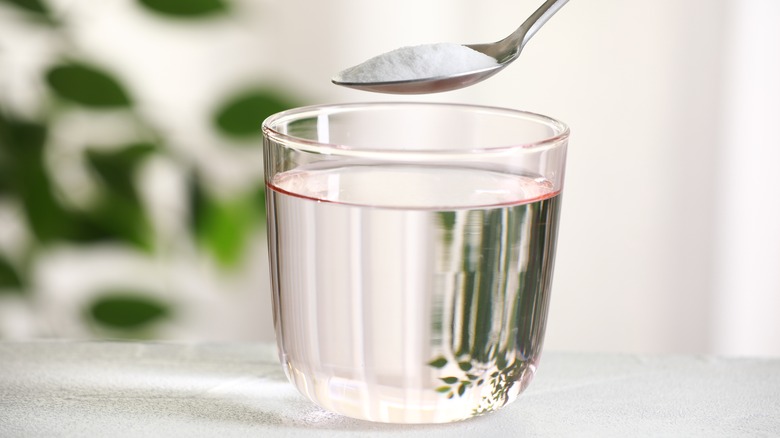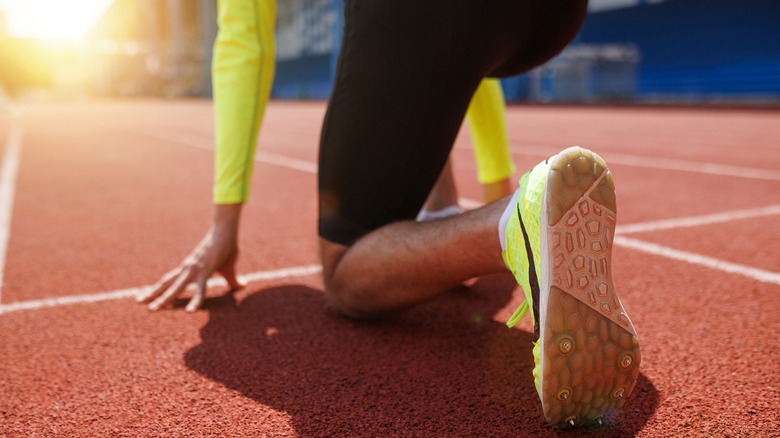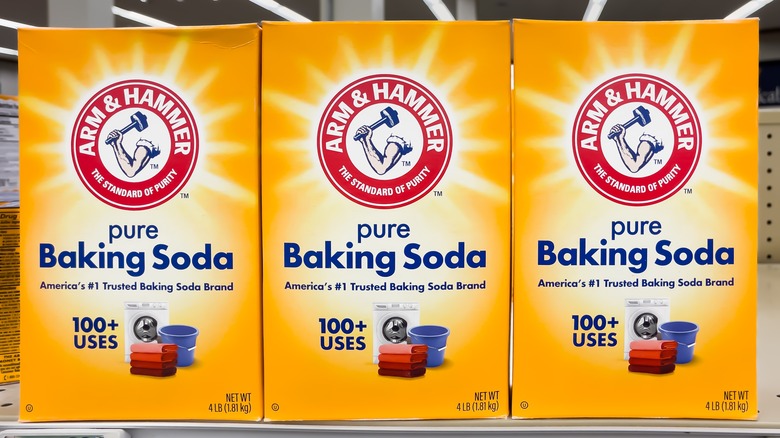PSA — Stop Drinking Baking Soda And Water
TikTok seems to have a hack for everything, from storing cheese in its original wrapper to transforming hand mixers into stand mixers. But when it comes to health, assessing trends with a dose of skepticism can save you a lot of trouble. The latest fad to remain wary of is baking soda water, a supposed acid reflux cure and athletic performance enhancer.
This "hack" involves drinking water with a small amount of garden variety baking soda (aka sodium bicarbonate) mixed in. Allegedly, the slightly alkaline pH of baking soda (8.3, just past the neutral 7-8 median) is meant to counteract the impact of acidic foods on your gut. In some studies, such as one by the Journal of the International Society of Sports Nutrition, baking soda and water also showed promise in reducing muscle pain during high-intensity workouts.
However, playing with your body's pH is a dicey game. Your stomach's highly acidic pH of one is necessary for killing bacteria and preventing infection, a task which alkaline substances can disrupt. Excessive consumption of baking soda can even result in a condition called metabolic alkalosis, which happens when your body's total pH rises above 7.45 (compared to its average pH range of 7.35 to 7.45). This can cause tremors, arrhythmia, and even seizures (per Cleveland Clinic). And even in the short term, consuming sodium bicarbonate can cause side effects like fatigue, nausea, muscle cramps, dizziness, swelling, bloating, and stomach cramps.
Soda loading for athletes isn't a good idea
Consuming baking soda water, also known as "soda loading," has become a trend among athletes due to its supposed benefits. What could an antacid have to do with sports? A lot, actually. When you feel a "burn" during exercise, it's because of a build up of lactic acid in your muscles. Counteracting that with an ingredient designed to reduce acid could, theoretically, help athletes perform better in short, high-intensity workouts. Some experiments on this topic gave athletes doses of up to a tablespoon of baking soda daily, amounts that would likely trigger nausea or diarrhea in most people.
A ¼ teaspoon or up to ½ teaspoon of baking soda, mixed with water, is considered to be the maximum amount that an adult should take in a day, but even these smaller doses present risks. Baking soda is high in sodium, with a teaspoon of it containing almost an entire day's recommended amount. Because of this, long-term usage can also interfere with your body's ability to regulate electrolytes, which can lead to nausea, headaches, and muscle cramps at the tamer end and cardiac arrest, seizures, and even comas at worst.
If you're thinking about soda loading to get you to your next fitness goal, consider holding off and consulting your doctor before you do. People who should absolutely never be drinking baking soda include children, those who are pregnant or breastfeeding, and individuals with stomach ulcers, Cushing's syndrome, or heart problems, according to Cleveland Clinic.
Don't go overboard on baking soda supplements, either
Sodium bicarbonate isn't only used in cooking or as a natural cleaner. It is commonly sold in tablet form as an antacid, to treat symptoms like indigestion and heartburn. These tablets generally contain around 650 mg of sodium bicarbonate. Other over-the-counter meds have slightly higher levels, like the popular heartburn medicine Alka-Seltzer, which contains 1,916 mg of sodium bicarbonate. This has led many people to the natural conclusion that grocery store baking powder could also be taken for medicinal purposes — which it can be, if taken in small doses, for short-term relief only.
According to Cleveland Clinic, it is not recommended to regularly consume baking soda (in plain or medicinal form) over a duration exceeding two weeks. Baking soda can also have interactions with other medications, including aspirin and antibiotics, and may cause slowed absorption.
If you suffer from indigestion, you might instead consider avoiding fatty foods, alcohol, and caffeine; taking smaller and more frequent meals; and opting for non-alkaline medications such as proton pump inhibitors. If you're more interested in baking soda for its athletic benefits, it's better to start with stretching properly before and after workouts and eating a diet of anti-inflammatory foods to reduce muscle soreness. And if you wind up needing more than this to meet your needs, talk to your doctor before you pick up a box of baking soda.



